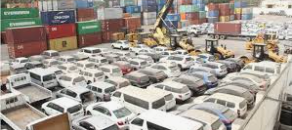
Importers and dealer of second-hand cars are rushing to make early orders for 2017 manufactured units, in a bid to beat Kenya’s eight-year rule on importation of used vehicles.
This, even as they remain concerned over the disruption in the global shipping industry brought about by the Houthi rebels attacks in the Red Sea in Yemen, who are targeting foreign ships, forcing shipping lines to re-reroute hence longer delivery time.
Major shipping lines with operations to the Port of Mombasa have re-routed their vessels avoiding the Red Sea and the Suez Canal.
The dealers have also raised concerns over Kenya Revenue Authority’s terms of enforcing the value for motor vehicles, which they say lacks proper justification.
“Therefore, the landing cost of a vehicle is not predictable hence sealing a deal with a customer before importation is at the risk of the seller,” Car Importers Association of Kenya (CIAK) national chairman, Peter Otieno, told the Star yesterday.
This, he said, is likely to affect imports, which are projected to fall for a third consecutive year. “We have so far imported 41,000 units only, the fi gures are going down,” Otieno said.
The Economic Survey 2024 by the Kenya National Bureau of Statistics shows the country imported a total of 78,127 used cars last year, which was an 11 per cent drop, compared to 87,648 imported in 2022. Imports in 2021 totalled 103,859 units.
The drop came as KRA moved to harmonise the valuation parameters of used motor vehicles where the taxman shifted to a bloc year on taxation of second-hand cars, meaning units that arrive even as late as December are paying the same taxes as those imported in January, same year.
This was from the
previous first month of registration,
which made late imports during the
year cheaper. Monthly second-car
imports which account for 80 per
cent of vehicles on the Kenyan roads
has since dropped to below 3,000
from the normal average of 5,000 to
7,000.

 © The Star 2024. All rights reserved
© The Star 2024. All rights reserved